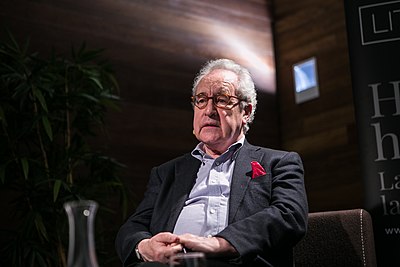A BOOKER prize winner, one of the most lauded writers in the English language today, John Banville says that every one of his books is a failure, and the act of writing leaves him constantly disappointed.
He will be at Glór on Saturday, March 5, as part of the Ennis Book Club Festival, appearing alongside fellow author Kevin Power.
Originally from Wexford, Banville’s first novel Nightspawn was published in 1971. His Revolutions Trilogy was published between 1976 and 1982, while his 1989 novel The Book of Evidence was shortlisted for the Booker Prize and won the Guinness Peat Aviation Award. In 2005 his thirteenth novel The Sea won the Booker Prize.
In addition, he publishes crime novels as Benjamin Black — most of these feature the character of Quirke, a pathologist based in Dublin.
He has won numerous awards and was made a Fellow of the Royal Society of Literature in 2007, while Italy made him a Cavaliere of the Ordine della Stella d’Italia (essentially a knighthood) in 2017. He is a former member of Aosdána, having voluntarily relinquished the financial stipend in 2001 to another, more impoverished, writer.
His latest novel is April In Spain, and it follows Quirke as he glimpses a familiar face while on holiday with his wife. It’s hard, at first, to tell whether his imagination is just running away with him. Unable to ignore his instincts, Quirke makes a call back home and Detective St John Strafford is soon dispatched to Spain.
But he’s not the only one en route: as a terrifying hitman hunts down his prey, they are all set for a brutal showdown.
The book has been described as ‘superb crime fiction for the connoisseur’ by The London Times.
While that’s a warm description of his work, Banville doesn’t agree with describing fiction as being of any genre.
“I don’t like the notion of genre, crime fiction, romantic fiction, literary fiction, it’s just fiction, it’s either good or not good. That’s the only distinction I would make.”
“The trouble about a crime novel is it has to have a crime in it. Already there’s a certain deprivation of freedom.
“My mission from the start was to write a crime novel without a crime in it. With April in Spain I’ve done so retrospectively. The April character in the book is supposedly the murder victim in an earlier book called Elegy for April, her corpse is never found in the earlier book.
“So when she reappears in this one it means there was no crime in Elegy for April. So retrospectively I’ve written a novel without a crime in it, which I’m very pleased about. Not that anyone would care a damn but I’m pleased!”
The central character, Quirke, is one he has returned to several times, but he doesn’t empathise with him.
“Oh no, I don’t like him at all, I find him an awful bore.
“I don’t think I could write about characters that I feel affinity with, that’d be like writing about myself and I’ve no interest in writing about myself whatsoever. I wouldn’t find that interesting.”
Asked if any of the characters reflect parts of himself, he says he finds Quirke’s daughter Phoebe interesting.
“Really she has some aspects of me, there is something of myself in her, but she’s a young woman, it can’t really be me-me.”
He finds it very hard to say what it is about her that resonates with him, but says it is something about how she is slightly out of step with life.
“I feel an affinity with that, I feel a chime and echo there. But then I think we’re all like that. None of us quite fit into the world and our own lives.”
Objectively speaking, Banville is a massive talent, one of the great living writers, so it is fascinating to hear him talk about writing, how difficult he finds it and how much frustration it causes him.
An online search on Banville quickly throws up an article which says he could often take a full day to craft a single sentence, which seems quite extraordinary, when a novel requires tens of thousands of words. Is it correct that he is so painstaking?
“Not in the crime books, I write the crime books quite quickly. They have to have a feeling of spontaneity. My other books, I think a great deal over the prose in them, but they’re more like poetry than prose I think.
“My non-crime books I write with a fountain pen on paper and then I transfer them onto the computer. With the crime books I write them directly onto the computer, the fountain pen and paper is too slow for writing this kind of fiction.”
Does he have a preference for the crime novels over his other work, or is it the other way around? “I don’t prefer either of them, I find them equally difficult. Writing is a terribly difficult thing, you know yourself, you write non fiction.
“Language is very, very difficult to work in, especially because most people think it’s easy to do, since we speak we must be able to write, but that’s not the case.”
Of necessity newspapers like this one are composed of articles that were written in relatively short blocks of time, and Banville says that while he worked in the media for years, there was no way he could have been a reporter.
“I was a sub editor for 35 years, the kind of person writers hated. I was always fascinated by reporters, there’d be a fire in a convent in the suburbs, they’d be told go out there come back and give me 600 words.
“The reporter went there, an hour later they came back and banged out 600 words. I was always fascinated by that, I’d no more know where to begin to describe the fire at the convent. I always had a great admiration for reporters.”
Incredibly, given how successful he has been, he says that his books are “all failures”.
It would be hard to find anyone else who would describe The Sea, a Booker Prize winner, as a failure, but Banville does, and he says he has to lie to himself in order to keep writing.
“The artist sets out to achieve perfection and as we know perfection is not of this world. Every work of art is a failure.
“The French poet Paul Valery said that a work of art is never finished, only abandoned. That’s absolutely true, you get to a point where you think I can’t do any more with this damn thing, so you say alright, I’ll pretend it’s finished, and move onto the next thing. You think the next thing will be perfect, you say I’ll get it all right next time, but you know you won’t. The only way to push on and do it is to lie to yourself.”
And why does he keep going, keep writing, if it is so punishing?
“I ask myself that every morning when I sit down to work! It’s a mug’s game. There’s little money in it, very little satisfaction, but I can’t not do it. It’s like breathing, if I stopped I would stop.”
He has another novel coming out in October, which he has worked on for five years now, and familiarity has bred contempt, even if it’s for his own work.
“I possibly know it by heart. Of course I hate it, absolutely hate it by now. It makes me sick just to think about it. It is difficult. What you have to do is make it look easy, as if you enjoyed it, that’s where the skill comes in.”
There are moments of pleasure in writing, but he says they never last very long.
“Now and then I’ll write a sentence or a phrase, I’ll hear it chime like a fingernail hitting a wine glass. But then of course you look at it again and you think, ‘no there’s something wrong’. There’s always something wrong.”
Seventy-six years of age now, he still writes for five to six hours a day and fully immerses himself in what he’s doing.
“Time moves differently. One day I was writing and my wife stuck her head in my study door and said I’m going to the shops. She put her head in again and said something else and I said I thought you were going to the shops. She said I have been to the shops, I had no sense of time having passed, I thought it was seconds but in fact it was an hour.
But it’s not just writers, sportsmen, a craftsperson, a journalist, a teacher, when you concentrate absolutely to do something that is difficult time does move differently.”
He is glad to be coming to Ennis, as he says there is a far better atmosphere than at similar events in cities.
“I like going to events in smaller venues, big city things I don’t like very much, they’re full of people who are competing with each other. I like a festival that celebrates books and authors and where the audience gets to get close to writers.”
Owen Ryan has been a journalist with the Clare Champion since 2007, having previously worked with a number of other publications in Limerick, Cork and Galway. His first book will be published in December 2024.


